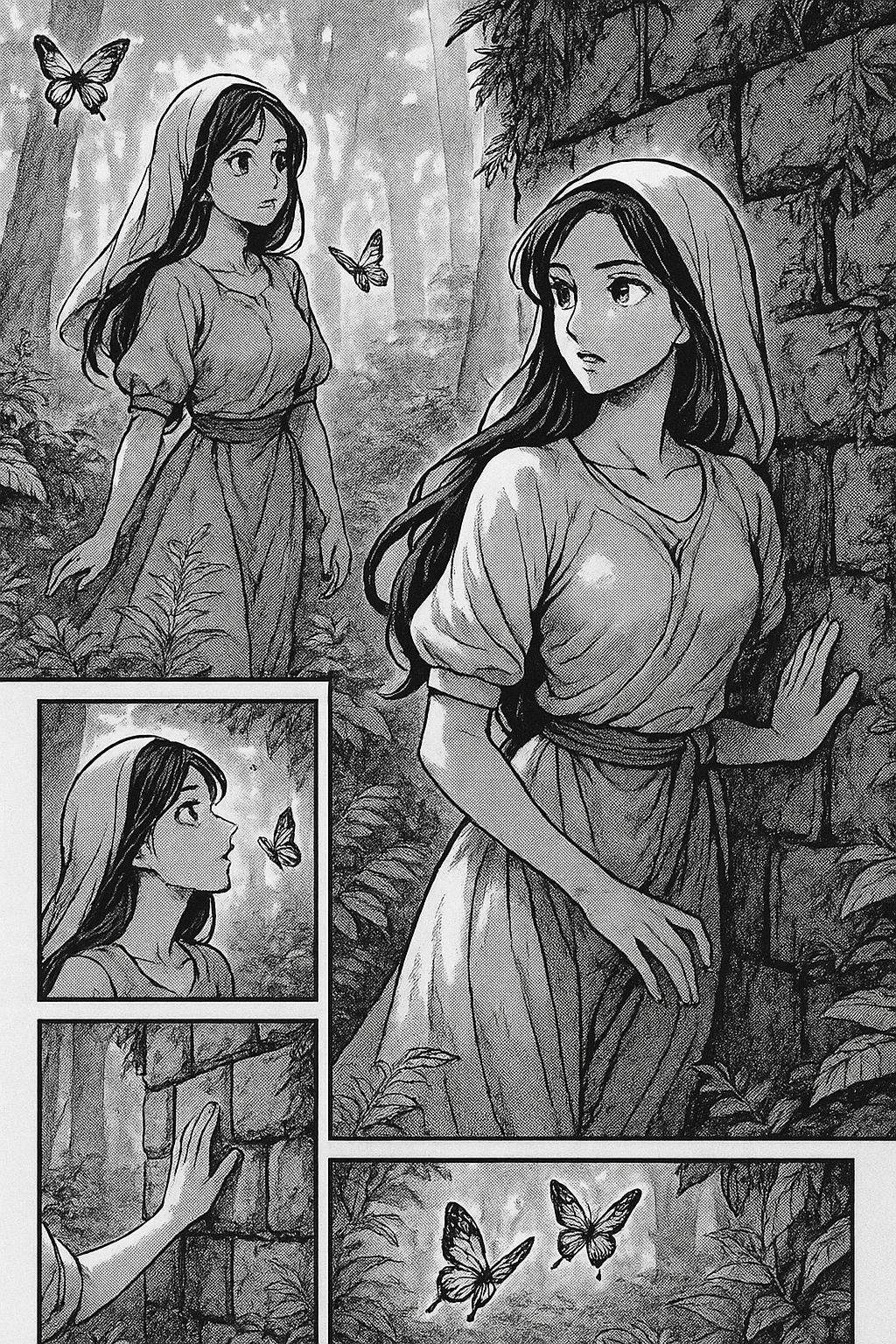- BR Shōnen
- Posts
- The Whispering Wall | A Muralha Sussurrante
The Whispering Wall | A Muralha Sussurrante
"O vento leva palavras que só os puros escutam."("The wind carries words only the pure can hear.")
In a hidden part of the forest near Caminho das Águas, there stood an ancient wall.
No one had built it.
No one remembered when it arrived.
It was simply there—covered in cipó vines, warm even in the rain, humming with something older than time.
Long ago, people used to visit it.
They left prayer stones, gathered forest herbs, and sat beneath the figueira-brava to reflect and make duʿāʾ.
The elders said the land was a trust from Al-Bāri, the Creator—and that every tree, every stream, was part of that amānah.
But over time, the world changed.
A highway was built nearby.
A foreign company came offering money—first to map, then to mine.
They promised schools, jobs, electricity, and clean water.
Some villagers signed papers they couldn’t read.
Others left for the city, pulled by stories of a better life.
The forest grew quieter.
And the wall was forgotten—not from malice, but from hunger, pressure, and dreams wrapped in screens.
Some elders said the wall was a witness.
Others said it was a warning.
But one girl listened.
Her name was Zahra Malik, and she was fifteen.
Her parents had moved from the U.S. to Brazil when she was a child, seeking a slower life, one closer to nature and faith.
Zahra grew up between cultures—her mother's Southern roots, her father's love for Qur’an, and the living heartbeat of the Amazon rainforest.
She rose at dawn with her grandmother for fajr, helped sweep the yard, and memorized short sūrahs by the river’s edge.
Quiet but observant, Zahra often wandered just past the banana trees… where the forest grew denser—and where the wall waited.
The forest was alive:
Araras (scarlet macaws) soared between the canopy.
A tamanduá-bandeira (giant anteater) once ambled past her like a dream.
The air smelled of crushed murici fruit and blooming jasmim-do-cerrado.
One day, after a heavy rain, Zahra followed a golden borboleta (butterfly) deeper than usual.
That’s when she saw it:
The wall.
Covered in moss and thick samambaias (ferns).
Buzzing softly beneath her bare feet.
Her heart beat faster.
She whispered:
"Allāhumma iftaḥ lī bāba raḥmatik."
"O Allah, open for me the door of Your mercy."
Then she reached out and touched it.
The air stilled.
The sabiás stopped singing.
And in the silence, she heard a voice in her heart:
"Al-Khabīr vê o que está escondido."
"The All-Aware sees what is hidden."
Zahra blinked.
She saw:
– Men in boots marking castanheira trees with red tape.
– Oil leaking into a sacred stream where botos (river dolphins) once swam.
– Her neighbors whispering about gold and signing more contracts.
She stepped back, heart trembling.
She placed her hand over her chest and whispered:
"Rabbi innī limā anzalta ilayya min khayrin faqīr."
"My Lord, truly I am in need of whatever good You send down to me." (Qur’an 28:24)
Then she ran home.
Told her grandmother.
And the next day, they gathered the remaining villagers beneath the figueira-brava and recited:
"Inna Allāha khabīrun bimā taʿmalūn."
"Indeed, Allah is All-Aware of what you do." (Qur’an 31:29)
That night, the wall glowed faintly.
And when they returned in the morning,
the red tape was gone.
The water ran clear again.
The forest sang its praise.
To this day, no one cuts trees near the whispering wall.
And every Friday after Jumu’ah, Zahra lays a prayer stone beneath it—
quietly whispering:
"Yā Rabb, ijʿalnī ʿalā ṣirāṭika al-mustaqīm."
"O Lord, keep me firm on Your straight path."
Because she knows—Al-Khabīr is always watching.
-FIM -

1.
Portuguese:
"Al-Khabīr vê o que está escondido."
English: "The All-Aware sees what is hidden."
Arabic:
ٱلْخَبِيرُ يَرَى مَا هُوَ مَخْفِيّ
Transliteration: Al-Khabīru yarā mā huwa makhfiyy
2.
Portuguese:
"Inna Allāha khabīrun bimā taʿmalūn."
(This is already an Arabic verse quoted in Portuguese from the Qur’an 31:29.)
Arabic (Original):
إِنَّ ٱللَّهَ خَبِيرٌۢ بِمَا تَعْمَلُونَ
Transliteration: Inna Allāha Khabīrun bimā taʿmalūn